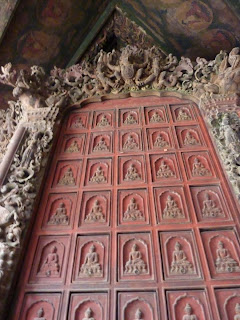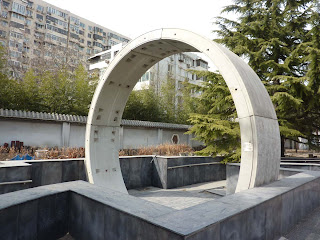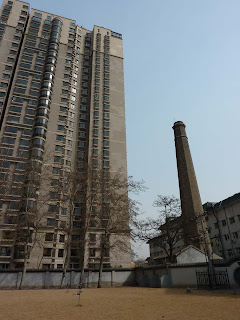On Sunday, I managed to catch up with a few friends and family members before heading off for some more sightseeing in Beijing! First, I went to the Zhihua temple, which was built in 1443 by a corrupt eunuch as his personal ancestral hall, but has since been converted into a Buddhist temple. Its a great example of Ming architecture and is more real in its faded beauty than some of the more modern, touched-up temples.
There were also some unique points about the temple, like the gigantic sutra cabinet that apparently revolved as well as a hall filled with tiny niches on the wall with little sutra figures in them - supposedly 9,999, but I didn't count!
The temple also hosts live Buddhist monk performances of music from the Ming dynasty, using instruments that were all unknown to me, including little pan-sized gongs, a flute, a tiny tiny reed instrument that looked like an oboe but only 4 inches long with no keys, something with many bamboo rods of different lengths, and a drum. It was pretty impressive, and also impressive that the monks made no attempt to look interested in what they were playing.
After getting my fill of Buddhist temple, I headed to the Ming Dynasty City Wall Ruins Park, a 1.5 km stretch of wall refurbished with many of the original bricks (but which in the interim have served as houses, air-raid shelters, and toilets). The wall itself was pretty boring, but little did I know that the Plum Blossom Festival was just starting in the park, and there were many amateur photographers focused on the beautiful flowers. I might have joined them just briefly... ;)
At the end of the wall was the Dongbianmen Watchtower complete with guards in period costume, with a modern art gallery inside. I climbed up onto the wall near the watchtower, and except for the banners, it looked like any other ancient Chinese city wall I've seen, similar to the ones in Xi'an and Pingyao. Or perhaps it was just the grey sky that was the same...
The art gallery though, was pretty cool, here is my favorite painting, called 'Traffic' or something like that.
And the building itself was a neat example of how the Chinese built multiple-story buildings in years past - with gigantic columns and beams, always always painted red.
And that wrapped up my weekend of Beijing-tourism-lite: look forward to more hardcore sightseeing adventures when my cousins Judy and Lisa arrive on Saturday!






































